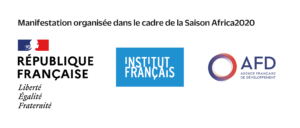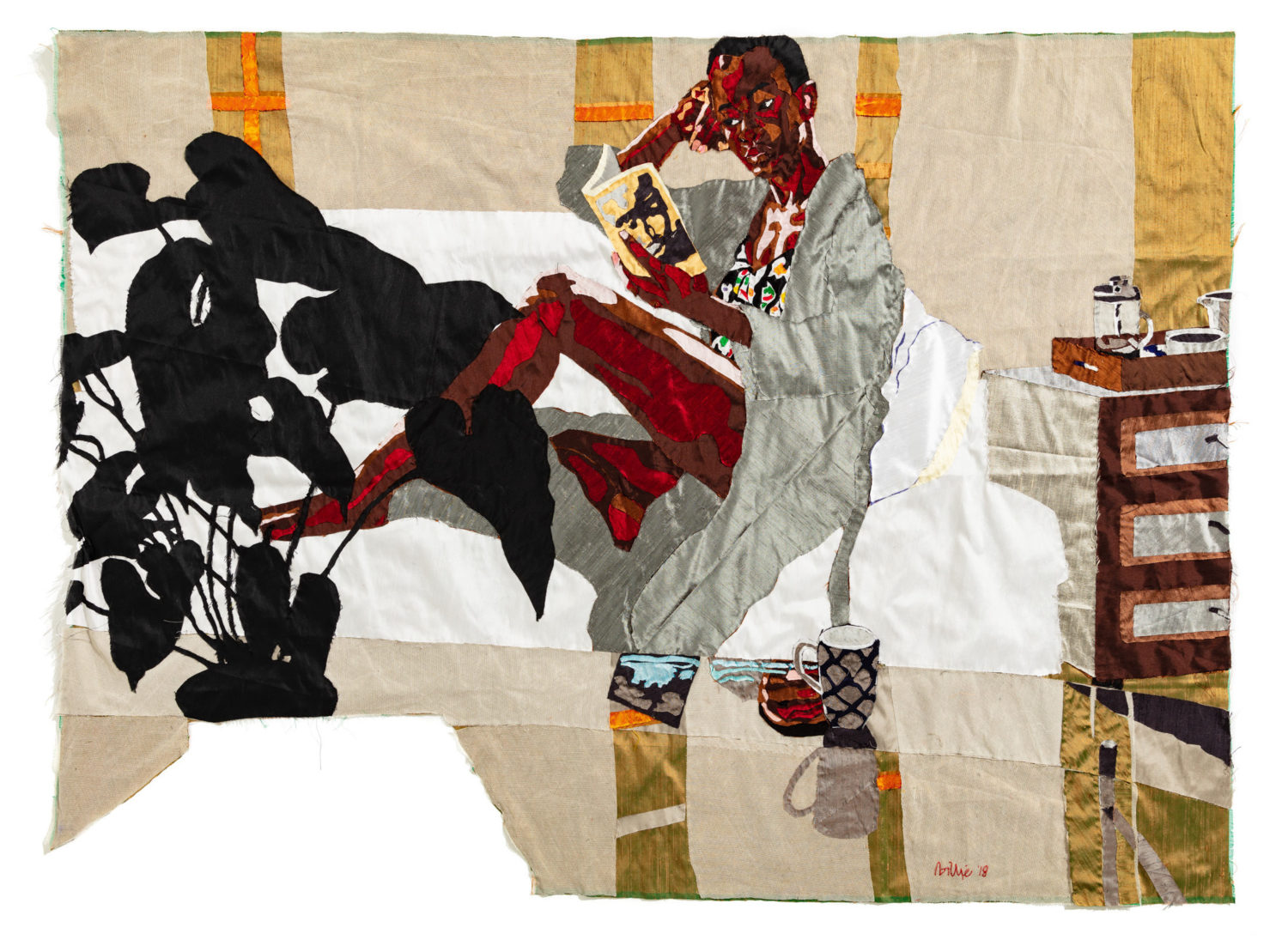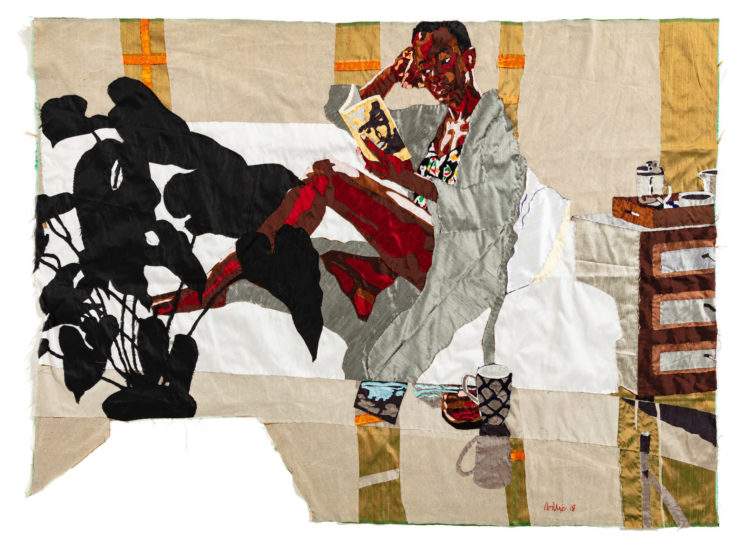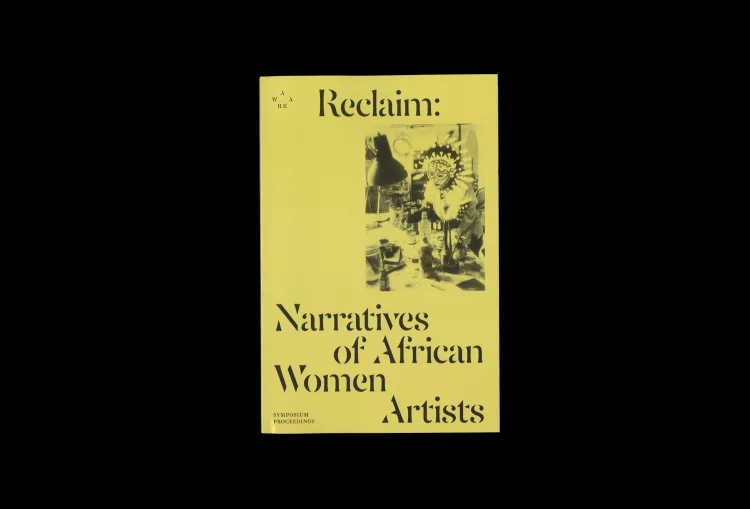Symposium
Billie Zangewa, In my Solitude, 2018, silk collage, 150 x 111 cm, Courtesy Templon, Paris – Bruxelles, © Billie Zangewa. Photo: Jurie Potgieter
This symposium occurs in the context of a partnership with the Africa2020 Season, a pan-African and multidisciplinary event that takes place in France from December 2020 to mid-July 2021. It is organized by AWARE in cooperation with the École du Louvre.
Bringing together researchers from various horizons, this symposium aims to shed light on the research on African women artists and to bring African perspectives to the foundational narratives of art history. The past few decades have seen concerted drive in Europe and the United States to produce global art histories, with little participation by scholars from other parts of the world, especially Africa. Alongside this initiative is an unprecedented growth in the number of research and writing on modern and contemporary African art. Major monographs on individual artists, groups and national art movements have appeared in recent years. Yet, only very few women artists have been featured in these publications, despite that they played important roles in the making of these histories. This symposium offers a critical platform for established and emerging scholars to evaluate and re-examine existing histories and archives as well as recover new ones to more fully account for the significance of work by African women artists past and present. Among the guiding questions for this symposium are: How have modern and contemporary art history in Africa been written? Which histories, media, identities, genders have been forgotten and which have been overlooked? Which new narratives do we need for the writing of more comprehensive future art histories?
The proposed interventions will examine four different axes, four types of “narratives” that will create a framework for reflection: lost narratives, narratives of womanhood, narratives of media, and institutional narratives.
It will be translated in French and English.
Practical information
The symposium will take place online from 13 to 16 April 2021, over four afternoons from 2 to 6 pm Paris time (UTC +2).
2:00 pm | Opening by Claire Barbillon (Director of the École du Louvre)
2:10 pm | Introduction by Camille Morineau (Director and co-founder of AWARE)
2:25 pm | Introduction by N’Goné Fall (General Commissioner of the Africa2020 Season)
Chairwoman: Nkule Mabaso (Curator and Lecturer at Wits School of Arts, South Africa)
2:40 pm | Introduction of the Session
2:45 pm | Sule Ameh James (Tshwane University of Technology, Pretoria, South Africa) – A Critical Analysis of Artworks by Two Female Modern Nigerian Artists: Afi Ekong and Clara Ugbodaga-Ngu
This intervention proposes an analysis of three selected works by two Nigerian women artists, Afi Ekong and Clara Ugbodaga-Ngu, whose significant contribution to the development of modern Nigerian art still goes unnoticed in official accounts.
3:20 pm | Nancy Dantas (MoMA, USA) – Bertina Lopes: A Modernist (and Panafricanist) in Arms
This study seeks to provide a reappraisal of Mozambican modernist Bertina Lopes (Maputo 1924 – Rome 2012). It engages with several portraits of the artist in her studio and uses these distinct images to tease out her anti-colonial, pan-African, feminist politics and the studio space as a stage which she used to sow and perform her modernist identity.
3:55 pm | Julia Rensing (Universität Basel, Switzerland) – Contesting the Archive: Namibian Artists’ Renegotiations of the Colonial Past
Focusing on a selection of artworks by Namibian artists Tuli Mekondjo and Vitjitua Ndjiharine, this intervention explores the women’s distinct artistic practices of engaging with the colonial photographic archive. It will show how both artists use divergent strategies to reconfigure the archive, centering the experiences and the lost or obscured narratives of women in their work as a way to reimagine and renegotiate the past and its significance for the present.
4:30 pm | Questions and answers
Keynote speaker: Nontobeko Ntombela (Wits School of Arts, South Africa)
Chairwoman: Nadine Hounkpatin (TheArtMomentum and artness.nl, The Netherlands)
2:00 pm | Introduction of the session
2:05 pm | Gladys Kalichini (Rhodes University, South Africa) – Conflicting Archives: Reimagining and Visualising Socio-Political Narratives of Women Freedom Fighters in Zambia and Zimbabwe
Starting from an in-depth engagement with the photographic archive of independence, this intervention focuses on analysing the underrepresentation of women in national liberation narratives. The suppression of historical narrative and women’s narrative is analysed through the study of women freedom fighters in Zambia and Zimbabwe.
2:40 pm |Martha Kazungu (MARKK Museum, Germany) – Njabala: towards activating the pluralities of Ugandan Womanhood as a site of resistance
This intervention focuses on records of and about female artists in Uganda through studio visits, interviews, articles and exhibitions.
3:15 pm |Ruth Belinga (Université de Dschang, Cameroon) – Aesthetic and socio-anthropological analysis of the art of seven Cameroonian women from three generations
This study is based on the example of seven Cameroonian women artists from three different generations who take a stand against the marginalisation of women’s art: Were Were Liking, Marceline Fouda, Justine Gaga, Ginette Daleu, Kristine Tsala, Gabriella Badjeck, and Aurélie Djiena.
3:50 pm | Questions and answers
Keynote speakers: Nadira Laggoune (musée national public d’Art moderne et contemporain d’Alger, Algeria), Rachida Triki (University of Tunis, Tunisia)
Chairwoman: Gaëlle Beaujean (Musée du quai Branly – Jacques Chirac, France)
2:00 pm | Introduction of the session
2:05 pm | Maha Tazi (Concordia University, Canada) – Women’s Creative Disobedience and the Continuing (Gender) Revolution in Post-Arab Spring Morocco (2011-2019): Slam Poetry and RAPtivism
This study is about the lyrical and rhetorical aspect of street art through slam poetry and rap. While these genres have already been considered by an abundant academic literature as playing a major role in the revolutionary expressions of Arab youth from the 1990s to the Arab Spring, this literature has rarely considered the role of women artists. By analyzing the productions of Moroccan women rappers and slam poets, Maha Tazi’s research aims to bring a feminist aspect to the literature on the creative insurgency that has characterized the Arab Spring.
2:40 pm | Felicia Nitsche (Universität Bayreuth, Germany) – Re-inscribing Antoinette Lubaki into Congolese Art History
This presentation focuses on the watercolor artist Antoinette Lubaki, whose work has been neglected since its creation in the 1920s and 1930s. Being one of the precursors of Congolese modern art, she was left out from the narrative, while her male counterparts caught the attention of the art world. The aim is to rehabilitate her work and the lost stories surrounding it.
3:15 pm | Portia Malatjie (University of Cape Town’s Michaelis School of Fine Art, South Africa) – African Sonic and Spiritual Practices : Strategies for a revolution
The paper considers the relationship between Black women’s spiritual work and activism. It considers how Black women and their spiritual work have either initiated or sustained revolutions, and how these revolutionary encounters are represented in contemporary African art practice. The paper will employ spiritual and sonic registers to read the work of Black women artists Lukhanyiso Skosana, Sethembile Msezane, Buhlebezwe Siwani and Bronwyn Katz.
3:50 pm | Question and answers
Keynote speaker: Senam Okudzeto (Artist, Switzerland)
Chairwoman: Sonia Recasens (Independent Curator, France)
2:00 pm | Introduction of the session
2:15 pm | Alice Korkor Ebeheakey representing Alice Korkor Ebeheakey, Dorothy Akpene Amenuke, Bernard Akoi-Jackson (Kwame Nkrumah University of Science and Technology, Ghana) – Breaking Boundaries and Borders: Undoing Stereotypes with the Stereotypes. The Case of Contemporary Art from Africa
This intervention focuses on the artists, critics, and curators who have pushed for the pulverization and cancellation of notions of boundaries that confined artists to an “esoteric ethos”, observing contemporary women artists whose practices problematize Africanity and challenge stereotypical ideologies about Africa, art, and women in art.
2:40 pm | Perrin Lathrop representing Perrin Lathrop & Ndidi Dike (Princeton University, USA) – Modern Women: Archiving African Modernism
This study interrogates the archives and history of the Harmon Foundation, a major patron of modern African art in America, through The Politics of Selection, a new archival collage installation by Ndidi Dike that investigates the material presence and absence of women in the story of African modernism and modernity.
3:15 pm | Amandine Nana (ENS Ulm and Université Paris 1, France) — Clara Etso Ugbodaga-Ngu and Miranda Burney-Nicol: Fragments of the trajectories of African women artists between Paris and London during the decolonisation period, through the prism of the Living Museum
This presentation analyses the presence of two African women artists (Clara Etso Ugbodaga-Ngu, a Nigerian artist, and Miranda Burney-Nicol, a Sierra Leonean artist) in a French cultural magazine aiming to explore the transnational networks of ideas within which these women asserted themselves in post-war Europe in the early days of the Independence.
3:50 pm | Questions and answers
Keynote speaker: Karen Milbourne (National Museum of African Art, Smithsonian Institution, USA)
Scientific and Organising Committee
Africa2020 Season
N’Goné Fall, General Commissioner of Africa2020
AWARE: Archives of Women Artists, Research and Exhibitions:
Camille Morineau, Co-founder and Director of AWARE; Anaïs Roesch, International Program Manager; Matylda Taszycka, Head of Research Programmes; Justine Lacombe, intern; Rose Laedlein-Greilsammer, intern
External Members:
Eva Barois De Caevel, Independent Curator; Nadira Laggoune, Director of the Musée National Public d’Art Moderne et Contemporain of Alger; Peju Layiwola, Artist, Founder of the Women and Youth Art Foundation and Vice President of the Arts Council of the African Studies Association; Nkule Mabaso, Independent Curator; Nontobeko Ntombela, Curator and Lecturer at Wits School of Arts; Karen Milbourne, Senior Curator, National Museum of African Art, Smithsonian Institution; Chika Okeke-Agulu, Professor of Art History, Department of Art & Archaeology / Department of African American Studies, Princeton University; Senam Okudzeto, Artist and Educator, Founder of the Ghanaian NGO Art in Social Structures; Fatou Sarr Sow, Sociologist, Director of the Gender and Family Institute of the Cheikh Anta Diop University in Dakar; Rachida Triki, Professor of Art History and Aesthetics, Tunis University
In partnership with Institut Français and Agence française de développement, in the framework of Africa2020 Season









